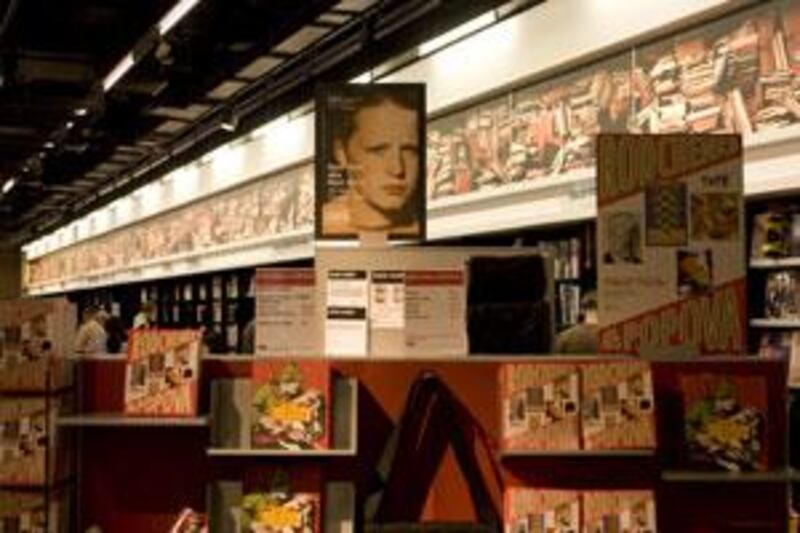CultureLabel.com offers museum-store shopping without the museum. Do you need a deck chair by the artist Peter Blake? Or perhaps one by the publishing magnate Felix Dennis? Would you like a Pigeon Lamp? It's designed by Ed Carpenter and looks like a pigeon. Or maybe your taste runs to recycled flat-packed leather slippers. They're by Unu and they're rather splendid. CultureLabel may be for you. The new website brings together the most unique items from the museum shops of 60 of Britain's most established cultural behemoths and cutting-edge galleries, including the Victoria and Albert Museum, The British Museum, The Royal Academy of Arts, Whitechapel Gallery, The National History Museum, The Barbican, The Saatchi Gallery and the Tate. Put simply, it's a kind of arty Amazon for the UK, a one-stop shop for thoughtful gifts that pack a cultural punch.
"Museums used to be full of filler merchandise," explains CultureLabel's founder Peter Tullin. "But in the last five years they have stocked much more merchandise you can't get anywhere else. We thought we'd aggregate their most unique products - take 10 per cent of the Tate's range, 15 per cent of the V&A - and put it in one place. People don't go to museum websites to shop, but that's exactly why they come to CultureLabel. We put the shop at the front of the museum, as it were."
According to Tullin, the idea for the shopping site was an obvious one: people love museum and gallery shops. In a survey by Superbrands (the "independent arbiter of branding"), Tullin says, "the Tate was acknowledged to be a more recognisable brand than Manchester United football club," he says. "On the last day of The Weather Project by Olafur Eliasson, there were more people in the Tate Modern than in Bluewater shopping centre. The Tate Modern covers 34,000 square metres while Bluewater extends to 154,000. The British Museum has overtaken Blackpool Pleasure Beach as the UK's most popular visitor attraction with 6.04 million visitors. We want to capitalise on that position and make more money for these great institutions."
Two years in the making, the site launched in July. In web terms, it's a portal, or shop window. Once you see something you want to buy (say a limited-edition print by the graffiti artist Banksy), the site directs you to the museum where you can purchase it. CultureLabel carries no stock; it merely whets your appetite and then points you in the right direction. "By being the place where art and commerce meet, we are hoping to increase online sales considerably, so that they account for 20 to 30 per cent of these museums' revenue," Tullin says.
Jo Prosser, the enterprises managing director at the Victoria and Albert Museum, says: "Those figures aren't quite right for us. We have a very successful website already and a different business model but we are interested in increasing money spent on our products and this is why we partnered with CultureLabel. "When people go to museum shops they are looking for something different and of value and they want to give something back," Prosser adds. "What CultureLabel has done is see that these behaviours match how people shop online. CultureLabel was very much something we wanted to be involved with."
Prosser admits that she hasn't yet checked out the site. In other words, she has not joined a group Tullin calls "post-consumerists": online shoppers in need of "emotional connection" to what they purchase. "They want to buy gifts or products that are collectable rather than disposable," says Tullin. Post consumerists would rather purchase an Isamu Noguchi Atari light sculpture for £25 (Dh149) than, say, something similar from Ikea. Recent hit products at CultureLabel have included London In A Bag from the London Museum, which features small wooden versions of Big Ben, Tower Bridge, buses and taxis. It costs £12.99 (Dh77). Another hit has been the Love Sculpture, a desktop replica of the original by Robert Indiana in the Tate, for £58.72 (Dh350).
As with Amazon, active buyers leave comments and reports about their purchases on CultureLabel. So far, 20 per cent of the site's traffic has been from the US and CultureLabel is keen to explore international partnerships. But is all this commerce a reflection of the fact that the cash-strapped UK government is withdrawing funding from the arts? "It's part of a general trend," says Peter Tullin. "The Museum of Modern Art in New York has opened a store in Tokyo, which reflects the fact that museums are more entrepreneurial. There is no reason we can't take these museums to the widest possible audience. That is the dream."





